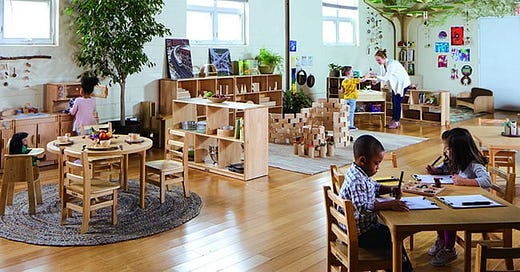Photo Credit: Kaplan
Issue #386 Education August 16, 2023
When I was very young, I don't think I went to preschool. One, it was not available at that time, and two, my mother was home taking care of my sister who was two years younger than me.
I do remember that when my sister was about three, my mother started a preschool in our basement. Her friends were professionals like teachers, doctors, and lawyers, who dropped their kids off at our house before they went to work. The teacher was a woman from Russia named "Miss Alice." We learned the Russian word for the headscarf Miss Alice always wore: "babushka." She took the bus and then walked the rest of the way to our house.
When my own children were small, they attended preschool at the local church and then went to half-day kindergarten. They went to a babysitter for the other half of the day. The school bus dropped them off at their babysitter’s house. Full-day kindergarten didn't start until many years later.
I also remember the year I taught first grade I had a new student who never left her mother's side until she was brought to the first day of first grade. At that time, kindergarten was not mandatory, and the little girl had absolutely no social skills or knowledge of how to work in groups and with other children.
I had to stop her from standing on her desk and singing at the top of her lungs.
Finally, in the past few years, people have started to realize how important preschool education is, especially considering that we learn more from birth to age 5 than at any other time in our lives.
President Joe Biden's administration has been a strong advocate for universal access to free preschool education. The president believes that early childhood education is a crucial component for long-term success and societal advancement.
As part of the American Families Plan, Biden has proposed two years of free, universal, high-quality preschool for all three- and four-year-olds in the United States. The plan underscores the administration's commitment to equipping young children with foundational learning and social skills before entering the formal school system.
With this proposition, the Biden administration aims to bridge the educational gap among children from different socio-economic backgrounds. The implementation of universal free preschool could redefine early childhood education and set a new standard for academic readiness.
Here are the five primary benefits of early childhood education:
Cognitive Development: Early childhood education provides an environment where children can explore, experiment, and interact with a variety of learning materials, fostering cognitive development.
Social and Emotional Growth: Preschool equips children with the necessary social and emotional skills. They learn how to engage in group activities, share, cooperate and develop empathy for others.
Introduction to Structured Learning: Early education introduces young children to a structured learning environment which eases their transition into formal schooling.
Language Skills: Children's language skills improve significantly in a stimulating environment. They learn new words, how to form sentences, and how to express their thoughts clearly.
Equality and Inclusion: Universal access to free preschool education, as proposed in the American Families Plan, could bridge the educational gap among children from different socio-economic backgrounds, promoting equality and inclusion from an early age.
Even for children whose parents are home during the child's early years, early childhood education is a powerful tool that can shape a child's future. By providing a solid foundation for cognitive development, social and emotional skills, and long-term academic success, it sets children on a path to lifelong learning and achievement.
The Republicans, of course, believe that having the state or federal government invest in preschool education for all children is "socialism."
However, investing in early education is an investment in our children's future. By giving them the best possible start in life, we empower them to reach their full potential and become successful, well-rounded individuals.
Let us know your thoughts about what new information you learned in the comments or in the Substack Notes feature.
You can always leave any questions in the comments or email us.
You can also receive up to six months of a paid subscription for referring people to us with the Share Button or the Refer Button.
This article is free to access for 1 week after publication. Please consider becoming a paid subscriber for $5/month or less to access all of the articles, the entire archive, and other benefits.




